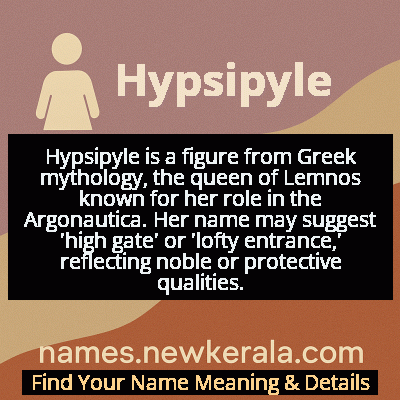Hypsipyle Name Meaning & Details
Origin, Popularity, Numerology Analysis & Name Meaning of Hypsipyle
Discover the origin, meaning, and cultural significance of the name HYPSIPYLE. Delve into its historical roots and explore the lasting impact it has had on communities and traditions.
Name
Hypsipyle
Gender
Female
Origin
Greek
Lucky Number
9
Meaning of the Name - Hypsipyle
Hypsipyle is a figure from Greek mythology, the queen of Lemnos known for her role in the Argonautica. Her name may suggest 'high gate' or 'lofty entrance,' reflecting noble or protective qualities.
Hypsipyle - Complete Numerology Analysis
Your Numerology Number
Based on Pythagorean Numerology System
Ruling Planet
Mars
Positive Nature
Generous, passionate, energetic, and humanitarian.
Negative Traits
Impulsive, impatient, moody, and can be overly emotional.
Lucky Colours
Red, maroon, scarlet.
Lucky Days
Tuesday.
Lucky Stones
Red coral, garnet.
Harmony Numbers
1, 2, 3, 6.
Best Suited Professions
Military, sports, philanthropy, leadership roles.
What People Like About You
Courage, energy, leadership, generosity.
Famous People Named Hypsipyle
Hypsipyle of Lemnos
Mythological Queen
Saved her father Thoas during Lemnian massacre and ruled Lemnos
Hypsipyle (Euripides)
Literary Character
Protagonist of Euripides' lost tragedy about her life story
Hypsipyle (Statius)
Epic Character
Major character in Statius' Thebaid who narrates her tragic history
Name Variations & International Equivalents
Click on blue names to explore their detailed meanings. Gray names with will be available soon.
Cultural & Historical Significance
In Roman literature, particularly in Statius' Thebaid, Hypsipyle gains even greater depth as a narrator of her own tragic history. Her extended account to the Argive soldiers represents one of the longest embedded narratives in classical epic, establishing her as a voice of feminine experience within a predominantly masculine genre. The death of Opheltes/Archemorus under her care connects her to the foundation of the Nemean Games, one of the four major Panhellenic games, thus linking her personal tragedy to significant cultural institutions. This multilayered cultural significance has ensured her enduring presence in the Western literary tradition.
Extended Personality Analysis
Hypsipyle's personality is characterized by profound emotional depth and moral complexity. She exhibits exceptional courage in crisis situations, as demonstrated when she defied the collective decision of Lemnian women to save her father. This act reveals both her independent thinking and her strong sense of familial duty. As a leader, she shows diplomatic intelligence in her interactions with the Argonauts, successfully navigating the political implications of their visit while forming a meaningful personal connection with Jason.
Her later experiences as a captive and nurse reveal additional dimensions of her character. The loss of her children and her forced servitude develop in her a deep capacity for empathy and resilience. When she becomes caretaker to Opheltes, she transfers her maternal instincts to the child, showing how trauma can transform but not destroy one's capacity for love and care. The accidental death of Opheltes represents the culmination of her tragic arc, highlighting how even her best intentions can lead to disaster—a theme that makes her one of the most psychologically realistic characters in Greek mythology. Her ability to endure multiple losses while maintaining her essential dignity makes her a powerful symbol of human resilience.
Modern Usage & Popularity
Hypsipyle remains one of the rarest mythological names in contemporary usage, primarily appearing in academic contexts, classical studies, and specialized literary works rather than as a given name for children. Its complexity—both in pronunciation and mythological background—has limited its appeal to modern parents, though it occasionally surfaces in fantasy literature and historical fiction as a character name. The name's tragic associations, involving mass murder, lost children, and servitude, further discourage its adoption despite the current popularity trend toward mythological names. In the 21st century, Hypsipyle appears more frequently as a subject of classical scholarship than as a personal name, with recent academic work exploring her significance in gender studies and reception studies. While names like Persephone and Circe have gained moderate popularity, Hypsipyle's specific combination of challenging pronunciation and dark narrative has kept it in the realm of specialist interest rather than mainstream naming practice.
Symbolic & Spiritual Meanings
Hypsipyle symbolizes the enduring human capacity for preservation and memory in the face of overwhelming loss. Her name's literal meaning—'high gate'—metaphorically represents both her royal status and her role as a threshold figure between different states of being: between life and death (saving her father), between cultures (Greek and Lemnian), and between social classes (queen and slave). She embodies the paradox of the preserver who cannot ultimately protect what she loves most, making her a symbol of tragic responsibility. The name also carries deep maternal symbolism, representing both biological motherhood (her sons by Jason) and symbolic motherhood (her care for Opheltes), exploring the theme of motherhood interrupted by circumstance. In contemporary symbolic readings, Hypsipyle represents the female storyteller—the keeper and transmitter of painful histories—making her relevant to discussions about trauma, memory, and the preservation of cultural narratives against the threat of oblivion.

